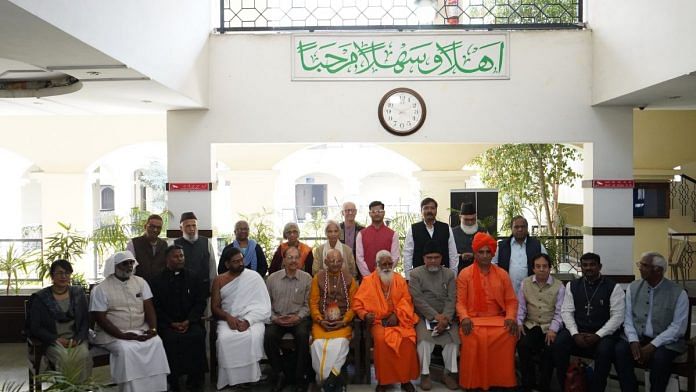It’s surprising to see that the January meeting between Jamaat-e-Islami Hind and Rashtriya Swayamsevak Sangh hasn’t gone down well with other Muslim groups. Any dialogue, which is conducive for democracy, enables various stakeholders to come on a common platform and iron out their differences. So why are Muslim leaders and political parties not welcoming the ‘dialogue’ between JIH and RSS, considered to be on the opposite end of the ideological spectrum?
CPI(M) leader and Kerala’s former education minister KT Jaleel accused JIH of meeting RSS leaders for personal interest since Media One, the TV channel run by the Jamaat, is facing a ban with a case pending before the Supreme Court. He also called JIH a “paper organisation” that has no support in the Muslim community.
But the reality is that no single Muslim group in today’s India can claim to represent the majority of Indian Muslims. They do only in some capacities and their involvement in any dialogue around Hindu-Muslim issues should be seen as a positive step. Fellow groups such as Kerala Muslim Jamaath and Indian Union Muslim League condemning the JIH-RSS meeting doesn’t seem to come from a place of genuine concern for India’s 200 million Muslim community but their own interest.
Also, an important aspect that nobody has acknowledged is that most of the stakeholders asserting to be speaking on behalf of the minorities are Ashrafs, there is no representation of Pasmandas who constitute the majority of Indian Muslims. Such dialogues can never be successful if Pasmanda are kept out since the fault lines between the two communities affect them the most.
Building on RSS chief Mohan Bhagwat’s meeting with five Muslim leaders in August 2022, prominent RSS leaders on 14 January met representatives of several Muslim groups at the residence of Delhi’s former Lieutenant-Governor Najeeb Jung. The meeting was attended by leaders of the Jamiat Ulama-i-Hind, the Darul Uloom Deoband, Haji Syed Salman Chishty of the Ajmer Sharif Dargah, Nai Duniya editor Shahid Siddiqui, and former Chief Election Commissioner SY Qureshi. Just days before the meeting, Bhagwat had remarked that “Muslims have nothing to fear in India but they must abandon their rhetoric of supremacy”.
Fellow Muslim organisations are criticising the meeting because they weren’t invited and won’t likely be in future for any similar deliberation. They fear that by not being part of any negotiations, they will lose out on acquiring any power or authority over the community. This leads us to the main argument that personal interest seems to be the main concern of these organisations.
Also read: Data shows upper-caste voters of both BJP and Congress support core Hindutva issues
Politics over talks
Of course, some criticisms could come from a genuine place where, in their worldview, they see RSS as anti-Muslim and therefore don’t want Muslim bodies to engage in any talks with it. According to the Muslim Jamaath, the RSS has been an enemy of India and Indian secular values and any dialogue with such an organisation would be tantamount to embracing an enemy. However, even if such organisations are genuine in their criticism and consider dialogue with RSS as problematic, it only shows their lack of political astuteness. In a country where Muslims are a minority, dialogue with any representative of the majority community, especially RSS, should be welcomed because Hindu-Muslim relations impact India as a whole.
The CPI(M) has been vocal in its criticism of the JIH-RSS meeting. Kerala chief minister Pinarayi Vijayan questioned the JIH’s authority in initiating the talks and said the stance reveals the organisation’s “hypocrisy”. “The logic of Jamaat-e-Islami that the RSS is an organisation that can be reformed and transformed through dialogue is equivalent to thinking that a leopard’s spots can be erased with a bath,” Vijayan said in a Facebook post.
But the CPI(M) itself has held talks with the RSS, purportedly to bring “peace” in Kannur city, a hotbed of political violence and killings in Kerala. This begs the question: why can’t JIH do it?
Political parties often think in terms of their vote bank politics and they might see the RSS’ outreach to Muslims as a threat to their own political narrative. Seeing Muslims as a mere vote bank and projecting oneself as the community’s ‘messiah’ is old politics. Therefore, any step toward resolving communal conflicts doesn’t sit right with them.
Ideally, anyone opposed to such talks should only be concerned about the impact it can bring on the ground and whether it can lead to similar engagement across communities in future.
Engagement of social/ideological groups is necessary for well-functioning democracies where the traditional, executive-led approach fails or remains ineffective.
Amana Begam Ansari is a columnist and TV news panelist. She runs a weekly YouTube show called ‘India This Week by Amana and Khalid’. She tweets @Amana_Ansari. Views are personal.
(Edited by Prashant)



